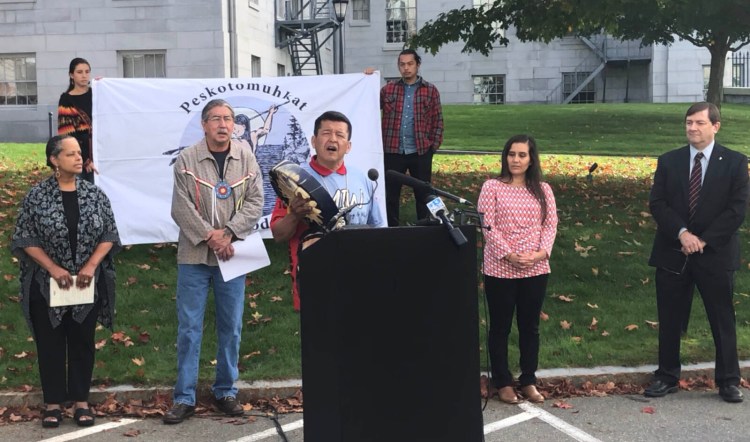AUGUSTA — As Maine celebrated Indigenous Peoples’ Day for a third time Monday, tribal leaders called for deeper reforms to restore the rights of Maine’s tribes and help indigenous communities.
Penobscot Nation Tribal Ambassador Maulian Dana said the change from Columbus Day to Indigenous Peoples’ Day remains a cause for celebration. But she and other leaders also said it is time for meaningful changes that would give tribes more independence under Maine law.
“We can say this (holiday) is a symbolic change, but it wouldn’t make much sense to talk about tribal sovereignty on a day glorifying the genocide of our people,” Dana said during a news conference at the State House Monday.
Tribal leaders also criticized Gov. Janet Mills, saying she has not done enough to restore tribal rights and instead seems committed to maintaining the societal status quo for tribal people.
“The state executive branch, Gov. Janet Mills, has been steadfast in maintaining the systemic norm of oppressing tribes. Maintaining control and holding tribes hostage with her lack of interest in engaging us with real discussions of tribal-state relations in a substantive way,” said Darrell Newell, the vice chief of the Passamaquoddy Tribe at Indian Township. “Tribal-state relations are broken and are in need of repair.”
In a news release Monday, Mills pointed to her decision to sign the law that changed Columbus Day to Indigenous Peoples’ Day in 2019.
Mills, a Democrat, also pointed to other actions she has taken, including signing laws that banned Native American mascots in Maine schools, strengthened water-quality standards and restored the tribes’ right to prosecute domestic violence crimes, as well as reinvigorating the Maine Indian State Tribal Commission and appointing a permanent tribal member to the University of Maine System Board of Trustees.
“Maine’s culture is in large part the direct result of those who first hunted, farmed, fished and occupied much of the land that we call our home,” Mills said in a prepared statement. “On Indigenous Peoples’ Day, let us pay tribute to those who were the first stewards of this land we love; celebrate their many contributions to our great state; and recommit ourselves to our shared home and future, with respect and trust for one another.”
But tribal leaders on Monday said they want more from Mills and highlighted a bill likely to go before the Legislature in January that would revisit a 1980 state law that they say stripped federal rights from tribes and exacerbated poverty for indigenous people.
KEY ISSUES: TAXES, FISHING, GAMBLING
Mills also vetoed legislation this year that would have restored gaming rights, allowing tribes to open gambling casinos in Maine as tribes have done elsewhere.
Rep. Rachel Talbot Ross, D-Portland is the lead sponsor of a bill, L.D. 1626, that would rewrite the terms of the 40-year-old settlement law to give tribes broader authority over issues of taxes, fishing and gambling.
The legislation is largely based on the recommendations of a special task force formed by the Legislature and backed by Mills soon after she took office. However, the reform package has been pushed backed twice since 2019.
Talbot Ross said the bill is meant to reset the relationship between the state and tribal governments.
She and others said the bill would put the tribes in Maine on the same legal footing as the 570 other federally recognized tribes across the United States. They said Maine’s 1980 Indian Claims Settlement Act is a failed experiment and rewriting it is long overdue.
Talbot Ross said a 2012 report found the law had created “structural inequities that resulted in conditions that have risen to the level of human rights violations.”
“After two centuries, the time to restore and enhance inherent tribal sovereignty is long overdue,” Talbot Ross said. “Two hundred years of state governance over tribal nations have produced extreme poverty, short life expectancies, poor health, limited educational opportunities and diminished economic development in their communities.”
Senate President Troy Jackson, D-Allagash also urged passage of the bill in 2022 and said it’s time for Maine to do the right thing for the tribes.
“You can’t lie to people consistently and then turn around and tell them to trust you,” Jackson said. “That, unfortunately, is something that has been happening far too often.”
CALLS TO REFORM 1980 SETTLEMENT
The four federally recognized tribes in Maine have a dramatically different relationship with state government than many other tribes across the nation because of the 1980 settlement act.
After years of lawsuits and negotiations, Congress approved the 1980 agreement providing the Penobscot, Passamaquoddy and Maliseet tribes with $81.5 million in federal funding in exchange for ending future land claims against the state. The tribes used much of that money to buy back about 300,000 acres. Yet the settlement led to decades of disagreement over state jurisdiction and tribal sovereignty.
There have been conflicts over fishing rights, lawsuits over water quality in industrialized rivers that flow through reservation lands and a legacy of Maine social services agencies taking away tribal children from their families. Tribes in other states have far more autonomy over their lands and almost all are allowed to host casinos on tribal lands.
The news conference at the State House was followed by a virtual rally streamed on Facebook, with speeches and performances by indigenous leaders and artists. Tribal leaders urged participants in the rally to call the governor’s office to demand passage of legislation reforming the 1980 settlement act.
Mills and her predecessor and likely opponent in 2022, former Republican Gov. Paul LePage, have both had rocky relationships with the four federally recognized tribes – the Maliseet, Micmac, Penobscot and Passamaquoddy, collectively known as the Wabanaki.
In 2015, under LePage, both the Penobscot and the Passamaquoddy tribes withdrew their non-voting members from the Legislature in protest after LePage rescinded his own executive order that required consultation with the tribes on issues that affected their people.
Comments are not available on this story.
Send questions/comments to the editors.



